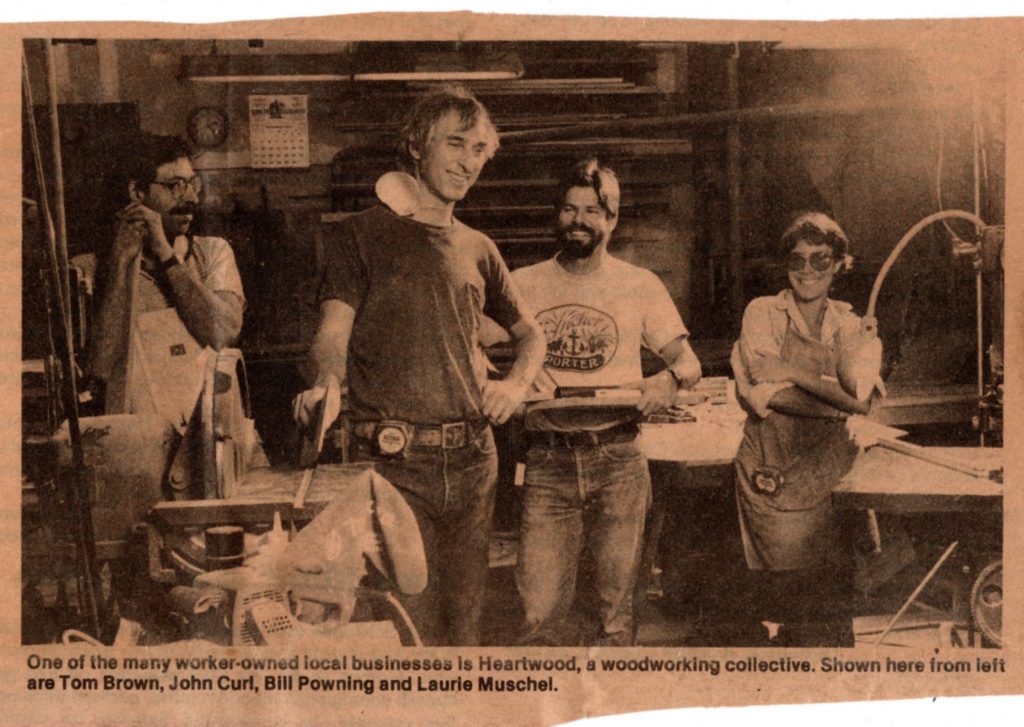I was a custom woodworker at Heartwood Cooperative Woodshop in Berkeley for over forty years. A group of us ran the shop, usually six to eight who worked full time, plus a few part-timers and hobbyists. I did mostly cabinetry, a lot of kitchens, some furniture, and a wide variety of other woodworking projects. Trees are truly wonderful, and Heartwood gave me the opportunity of working with many different trees, as well as skills that nurtured me for a lifetime, skills in working with wood, and in working collectively with other people. I was one of the founders of the shop in 1974, and worked there until I retired. The last I heard, the shop is still going strong, so we must have been doing something right.

If you’re interested in the economics of social change, you might find the history of Heartwood and its predecessor, Bay Woodshop, to be interesting, which I included in my book, For All The People.
Worker cooperatives have a long history in America as a countercultural opposite of capitalism, and also as a strategy of liberation and social revolution. Way back in the early 1800s, near the beginnings of the so-called industrial revolution that has brought us to this climate crisis, many workers and their labor unions formed worker co-ops in many industries, as an alternative to being forced down into what they considered wage slavery. In the aftermath of the Civil War, the largest labor union, the Knights of Labor, attempted to build a national network of worker cooperatives that they hoped and planned would form the core of a new economic system based on equity and social justice, that they called the Cooperative Commonwealth. Their plans were dashed in 1886 when the national movement for the eight-hour work day resulted in the Chicago Haymarket “riot,” and the powers that be took the opportunity to clamp down hard on all opposition.

That epic working class saga is at the core of my book, For All The People, and its predecessor, History of Work Cooperation in America.
The title “Worker Co-ops vs Wage Slavery,” encapsulates both the history and my own personal struggle. When I was young I worked at a variety of jobs, both office and manual work, so I knew what it was like, and swore to myself that I would not spend my whole working life as an “employee,” taking orders from a boss or supervisor.
But I didn’t see any alternative in the people around me. All the men in my family were employees. Their days were defined by the labor laws. None of them liked it much, and every one of them would have escaped in a heartbeat, if they thought they could. But you had to make a living. Payday was the whole point. Putting food on the table and paying the rent. Losing your job could mean disaster. You were stuck in your best option. That’s what they used to call wage slavery.
My grandpa was one of those oppressed immigrants who flocked to America seeking “freedom.” But what did it mean to be “free”? The Civil War was between two economic systems, only one of which was “free.” Free meant that that nobody could force you to work. You had to agree to be somebody’s “employee.” Society had worked out certain rules and customs regarding the rights and responsibilities of “employees.” That is one of the cores of our system. If you don’t want to work for somebody else, you can always start up your own “business.” This is the “free enterprise” system, where it is equally illegal for an international corporation and a homeless person to sleep under a bridge.
Through a worker cooperative I personally found a useful, humane and sustainable way to make a living. So you might say that I have seen the Revolution, and it works. I also participated in the larger movement in the Bay Area, with the InterCollective in the 1980s, and with today’s Network of Bay Area Worker Co-ops and the US Federation of Worker Cooperatives.
At the same time as I was trying to live my life at work without being destroyed by the system, I also spent a lot of time digging around dusty tomes in Berkeley libraries. I was researching cooperatives and the history of cooperatives, particularly worker cooperatives, and why they are not a basic structural sector of our economic system. I started by collecting materials and looking for historical patterns, which were certainly there. That is where I uncovered the history of worker co-ops in the early labor unions, which eventually became my book, For All The People: Uncovering the Hidden History of Cooperation, Cooperative Movements and Communalism in America.
Cooperatives are not utopian. Utopias are pre-packaged, but co-ops are pragmatic and flexible. The structure of any co-op is determined by the situation; co-ops work better in some situations and in some industries than in others. I thoroughly enjoyed working over four decades in a worker coop, but I also saw that some people are more naturally cooperative than others and some are more individualistic. We have both instincts, and need to balance them. It’s all a matter of consciousness. One shoe doesn’t fit all. Co-ops of course need leaders, like all human creations. Worker co-ops are also not a panacea for all that is wrong with the current system. Human nature being what it is, any human creation is subject to human folly. There are no panaceas, apart from the wisdom of the Indigenous elders. But economic systems don’t fall from the sky. People plan them. In the real world, the unregulated “free market” has never existed and does not exist.
A contemporary version of a cooperative economic system like the Knights of Labor proposed a century and a half ago, is not only possible today, but essential. We need to rethink and reform the labor laws, as we debate what it means to be an “employee” or “self-employed.” Technology has brought us to the climate crisis and the end of work as we’ve known it. The world is becoming both more globalized and, due to the pandemic, more localized at the same time. All economies will now be more local. People need jobs. A generation of young people without jobs is not a recipe for success. We need to restructure our local economic systems so that worker cooperatives and social enterprises can employ anyone wanting a job.
There will be a new society, and we are building it today.
You can find a copy of my book, For All The People here.


0 Comments